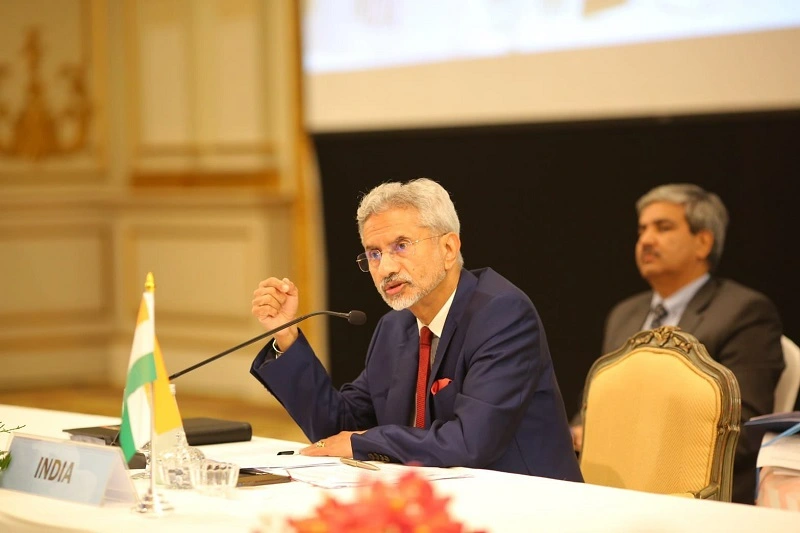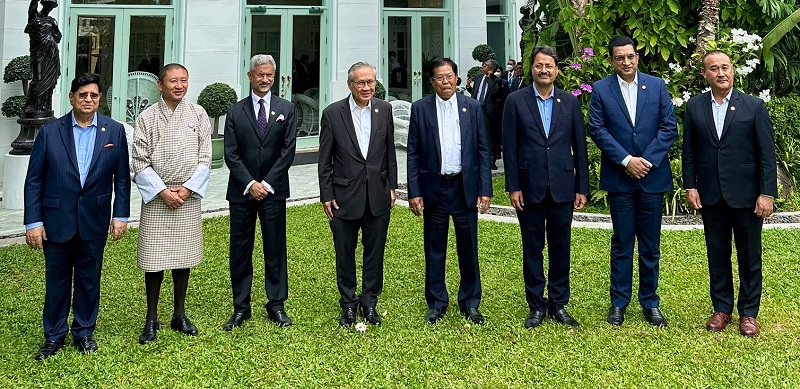

External Affairs Minister S Jaishankar co-chairing the 12th Mekong Ganga Cooperation meeting in Bangkok (Image courtesy: Twitter/@DrSJaishankar)
Striving to transform the Bay of Bengal into a bridge of connectivity, prosperity, and security – as envisioned by Prime Minister Narendra Modi – India on Monday called for unity and cooperation amongst countries in the region in order to face the increasing health and economic security challenges due to the volatile geopolitical situation.
Addressing the first Bay of Bengal Initiative for Multi-sectoral Technical and Economic Cooperation (BIMSTEC) Foreign Ministers’ Retreat in Bangkok, External Affairs Minister S Jaishankar suggested the member countries to focus on strengthening resilience and coordination considering the current challenges.
“Explored new facets and activities to enter new areas of cooperation. Food, health and energy security are common concerns. Technology solutions can be subject for both collaboration and exchange of best practices,” tweeted Jaishankar after the meeting which he said witnessed an “open and forward looking” discussion among colleagues.


Established in June 1997, the BIMSTEC regional grouping forms a unique link between South and South-East Asia with five members from South Asia (Bangladesh, Bhutan, India, Nepal and Sri Lanka) and two from South-East Asia (Myanmar and Thailand).
Last year, Prime Minister Narendra Modi too had called upon fellow leaders to strive to transform Bay of Bengal into a bridge of connectivity, prosperity, and security among the BIMSTEC-member countries.
“The mainstay of better integration, better trade, and better people-to-people relations between us is better connectivity. However much emphasis we give to it is less,” said PM Modi while addressing the 5th BIMSTEC Summit hosted in virtual mode.
The Summit saw considerable progress being achieved in the BIMSTEC connectivity agenda with the adoption of the ‘Master Plan for Transport Connectivity’ by leaders which lays out a guidance framework for connectivity related activities in the region in the future.
The sixth edition of the BIMSTEC Leaders’ Summit, scheduled to be held in Thailand on November 30 this year, is expected to be the first in-person summit in five years.
Emphasising the strategic geopolitical and economic importance of land link between the South Asian countries, Bangladesh, Bhutan, India, Nepal – commonly referred to as ‘BBIN’ countries – are already deliberating extensively on optimising cross-border connectivity.
On Sunday, while co-chairing the 12th Foreign Ministers’ Meeting of Mekong Ganga Cooperation (MGC) Mechanism in Bangkok along with Laos Foreign Minister Saleumxay Kommasith, India’s EAM specifically urged for prioritizing the implementation of the India-Myanmar-Thailand Trilateral Highway.
“Expedite the conclusion of the Motor Vehicles Agreement between the three countries,” tweeted Jaishankar calling for the early conclusion of discussions on the pending bilateral Motor Vehicles Agreement to facilitate cross border movement of vehicles.
Established in the year 2000, the Mekong Ganga Cooperation, an initiative by six countries – India and five ASEAN countries, namely, Cambodia, Laos, Myanmar, Thailand and Vietnam for cooperation in tourism, culture, education, as well as transport and communications, remains one of the oldest sub-regional cooperation organisation.
With both the Ganga and the Mekong – which flows from its source on the Tibetan Plateau in China through various Southeast Asian countries – being civilizational rivers, the MGC initiative aims to facilitate closer contacts among the people inhabiting these two major river basins. It remains one of the oldest mechanisms of lower Mekong region and is guided by India’s Act East Policy.
New Delhi has funded, completed and continues to finance several MGC Quick Impact Projects in Cambodia, Vietnam, Laos and also implemented several community development projects under the Rakhine State Development Programme (RSDP) and Border Area Development Programme in Myanmar.
Looking at the northeast as the gateway to south and southeast Asia, India is pushing for an early completion of the India-Myanmar-Thailand Trilateral Highway and its extension to Cambodia, Laos and Vietnam which can become a vibrant economic growth corridor.
Prime Minister Narendra Modi's upcoming five-nation tour, beginning on July 2, will see significant advancements…
Chief of the Army Staff (COAS) General Upendra Dwivedi on Monday departed on an official…
Western nations will not succeed in inflicting a "strategic defeat" on Russia, Russian Foreign Minister…
Israel has launched at least 50 aerial strikes across Gaza, with a significant focus on…
As part of its ongoing humanitarian support to Afghanistan, India recently hosted a five-day 'Jaipur…
A large number of Tibetans and other well-wishers gathered in Dharamshala in Himachal Pradesh's Kangra…